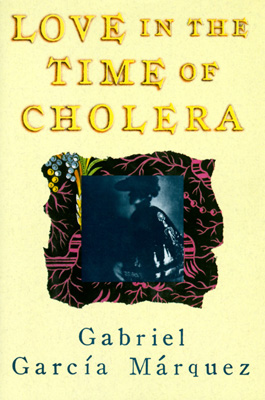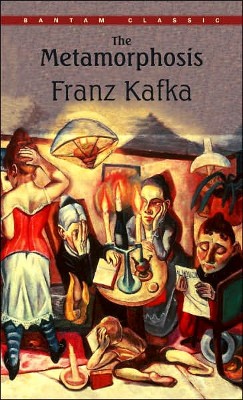
Subscribe to:
Post Comments (Atom)

You're Love in the Time of Cholera!
by Gabriel Garcia Marquez
Like Odysseus in a work of Homer, you demonstrate undying loyalty by
sleeping with as many people as you possibly can. But in your heart you never give
consent! This creates a strange quandary of what love really means to you. On the
one hand, you've loved the same person your whole life, but on the other, your actions
barely speak to this fact. Whatever you do, stick to bottled water. The other stuff
could get you killed.
Take the Book Quiz
at the Blue Pyramid.

You're Infinite Jest!
by David Foster Wallace
While you1 consider yourself2 to be clever,
there are those3 who think you're just full of yourself or, perhaps worse,
playing a joke4 on everyone around you, and yet you are pretty sure that
you really are that brilliant after all, since people would hardly take the time to
get to know you5 if they didn't care very deeply about what you had to
say to them, to wit, about their lives, their hopes, their dreams, their fears, their
drug habits, and of course what videos6 they prefer to watch, since,
after all, your impressive vocabulary and tendency to go on and on7 makes
you seem superior, able to educate them, and really drive a sense of something
ineffable into their measly little skulls while you are not above making a cheap
gag or really going after anyone or anything or telling them about incredible
futures involving tennis, geopolitics, and
1Meaning you personally, not someone like you or your own
personal daddy, for example.
2As well as you can see yourself, which, frankly, may not be that well.
3Though we wouldn't deign to be so peripatetic as to name them here, mind.
4Jokes, though not common in Victorian England, were known to originate
sometime in ancient history, perhaps as early as the time of Babylon, or even before.
It is thought that the history of the joke plays an integral role in the mindset of
the characters depicted here, though you may disagree at this point, in which case I
am facing quite the dilemma in relaying this narrative, no?
5It is rather time consuming, after all.
6Ha!
7and on and on and on...
Take the Book Quiz II
at the Blue Pyramid.

You're The Metamorphosis!
by Franz Kafka
Though you think you're in the midst of a dream, the fact of the
matter is that your life has become a nightmare. The nightmare at first seems
horrific to you, but you are slowly able to adjust to the facts of the matter
and settle down and make do with what you've been given. There are those that
would say you're pointless and absurd, but you're really just trying to
demonstrate that people can (and do) adapt to anything, no matter how absurd
it is. Not that this will really inspire them to change, because they probably
don't understand.
Take the Book Quiz II
at the Blue Pyramid.

8 comments:
Going further, where Saturn lies in your composite chart, you two are faced with the challenge of a Great Work, or Gesamtkunstwerk. It may be a joint project unfolding over years, such as raising a family or building a business. It may involve some perceived misfortune to which you can potentially rise with strength and integrity.
[...]
Behind all fancy verbal posturing about relationships, home is really the bottom line. They do it or they don't. That's where a couple walks their talk, if they are truly committed to each other. Or where they face the truth of the limitations on their commitment. Legalisms aside, making a home together is essence of the life-partnership society calls 'marriage.'
These issues are pressing for most couples, but with composite Saturn in the fourth house, for you two, home is everything. It is the Great Work. It is the make-it-or-break-it issue of your bond. And to get it right, you will have to work hard.
http://books.google.com/books?id=9Iwc1I8d4rIC&lpg=PA6&dq=The%20Age%20of%20Anxiety%20%22It%20was%20the%20night%20of%20All%20Souls%22&pg=PA6#v=onepage&q=The%20Age%20of%20Anxiety%20%22It%20was%20the%20night%20of%20All%20Souls%22&f=false
https://youtu.be/7NvllmNib8Y?si=lSwOh1Ew7jfJ5AH1
I will put the Purple Hairstreak Exercise here. That is the message of the sukkah, the provisional tent with stars as the ceiling, which is finding a place of spiritual sanctuary among and in spite of temporal habitations. The palm fronds and citrons are aide-mémoires. I find myself less attracted to the images of faith, and return once again to the writing. To read what is written there, and this time, be receptive to the message.
אֲנִי לְדוֹדִי וְדוֹדִי לִי / I am my beloved and my beloved is mine. Shir Hashirim 6:3.
"And where God is depicted as a husband or romantic partner in Jewish tradition, the implications are frequently disturbing. In his extensive use of the 'faithless wife' analogy, the prophet Hosea fulminates against Israel’s adulterous attraction to other gods, an infidelity that leaves 'her; legitimately deserving of violent punishment. The Book of Lamentations expresses this violence outright, drawing explicit focus to the disgraced body of Zion. She is seen not merely weeping, humiliated and scorned by her former friends, but even coded as the victim of sexual violence — 'snatched at,' 'raped,' 'her nakedness exposed,' 'with unclean blood clinging to her skirts.' This trend of depicting nation as woman continues to find expression right down to the present day, with modern Israeli authors like Amos Oz and David Grossman portraying — with rather more sensitivity than Hosea — vulnerable, tragic, frustrated heroines as embodiments of the Jewish nation-state.
Constructing the encompassing body of the nation as female (along with ships and sports teams) is not limited to Jews, and in fact is common in the wider culture. However, the Hebrew language also genders not only soul (neshamah) but self (nefesh) in the feminine. Relative to the penetrating presence of divine life-force, the containing receptacle of each individual is 'female,' regardless of biological sex. At some level, this is presumably a human projection of our reproductive mechanism onto the mystery of existence: If matter is mother, some tiny animating spark of encoded intelligence from the great Other is still needed to seed creation.
Gender, then, is metaphor — in the deeper sense of the word: a splitting into parts. For as Deuteronomy 4:35 reminds us, at root 'there is nothing else but God.' The supposed duality of lover and beloved must therefore be mere playfulness, a contraction of the all-pervasive Self-awareness of God precisely so that It might experience the delight of being found and known and merged with once again.
A famous midrash (Bereishit Rabbah 8:1) understands the description in Genesis of humanity’s creation as an account of primordial man and woman being separated out from one original androgynous body. This separation, say the rabbis, lets us go from being whole but unconscious of our wholeness to being able to approach one another face to face, panim el panim. It is only thus that we can see the presence of God in one another — and find ourselves as both lover and beloved, rooted into the cosmos by the experience of love itself."
https://www.myjewishlearning.com/article/am-i-my-beloveds/
https://www.google.com/books/edition/Because_My_Soul_Longs_for_You_Integratin/tCg9EAAAQBAJ?hl=en&gbpv=1&dq=panim%20el%20panim.&pg=PA84&printsec=frontcover
Exercise 91.
Thank you, for reminding me.
I have many errands today, mowing, andsetting up instructions for the sitter.
I am bringing my supplies with me to work on Exercise 91 while I am away from home.
Yes, I am getting up early to work on this.
My nephew is very interested in the toilet. He makes a beeline to it, to splash in it, throw remotes, keys, et cetera into it. Even with the door closed, the seat down, he is persistent.
https://ifstudies.org/report-brief/in-pursuit-marriage-motherhood-and-womens-well-being
https://www.scribd.com/document/937208230/ENRICH-Marital-Satisfaction-Scale-Fowers-and-Olson
https://onlinelibrary.wiley.com/doi/10.1111/nhs.13053
Post a Comment